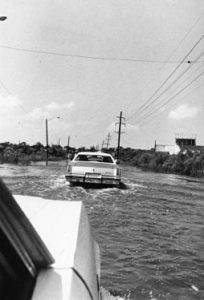Hurricane Research at the GSU Library

Hurricanes destroy property and take lives, but they also inspire many research topics. Storm related questions include:
- Does climate change mean more and stronger storms?
- Is the Saffir-Simpson scale of hurricane intensity accurate?
- What is the human cost of living through a monster storm?
To get started researching topics like these, brainstorm keywords and phrases:
- hurricanes AND “global warming”
- hurricane AND social
- “Saffir-Simpson Scale”
“Quotes” hold a phrase together in the order you write it, while UPPERCASE AND searches for the overlap between two ideas. Don’t forget to brainstorm synonyms. Hurricanes can also be referred to as tropical cyclones. Global warming can be climate change or Anthropocene. Hurricanes affect infrastructure and coastal development.

The Discover search box on the library web page is a gateway to more technical information about hurricanes. One you run a search, remember to use the option box on the left side to restrict results to academic journals. Discover searching yields a broad swath of articles across a large variety of disciplines.
Gale Virtual Reference Library also offers several extensive, current articles on hurricanes:
- “Hurricanes and Extreme Weather Events” in Water and Ice.
- “Tropical Storms and Cyclones” in Storms, Violent Winds, and the Earth’s Atmosphere
- “Hurricane Forecasting” in Weather and Climate: Notable Research and Discoveries.
For current news coverage within hurricane zones and affected regions, search for articles in LexisNexis Academic. For more hard science, there is Proquest Science Database and ejournals at Science Direct and Wiley Online Library. Weather/atmospheric science is a branch of physics, while disaster prevention often involves engineering. These are both math heavy disciplines. In addition, Wiley also publishes scholarly, social science and geography journals. Your CampusID and password are required to access ProQuest Science, Science Direct, LexisNexis, Gale Virtual Reference Library, and other databases from off campus.
While not up-to-the-minute, books can provide background, history, and terminology. GSU has eBooks that you can read anywhere you have an internet connection.
Among open web resources, the National Hurricane Center is a great place to start. The map in the center of the home page features current hurricane activity, while the thumbnail maps below track individual storms’ rain and wind speeds. Open the menus at the top for everything from an explanation of hurricane categories, to lists of storm names, to FAQ. To pinpoint a storm’s location, try Google and Bing maps.
Whatever your background or project, and of course if you are simply curious, the GSU libraries offer a deluge of hurricane information.